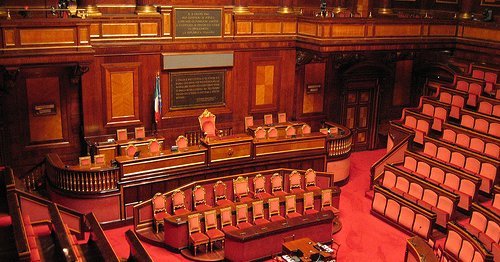If, in the aftermath of the current elections, the newly elected government is afflicted by the same instability in the Senate that plagued the former one, the root cause can be found in our system of governance. This is to say that if Italy’s political process is going back to inertia, as was the case under the outgoing Prodi Government, the fault does not lie entirely with the incompetence or ineptitudes of our leaders. Why is this?
Bicameralism in Italy
The voting in the Chamber is based on the majority premium, so that whosoever wins has a sufficient number of deputies to enable him/her to legislate. However, in the Senate, the electoral lists must pass according to their percentage. Parties must pass an 8% threshold at the regional level (or 3% if members are of a coalition on the condition that the coalition gets more than 20% of the votes within that region). Due to our perfect (and redundant) bicameralism, it is widely acknowledged that our government needs to have the majority in both chambers. This leads us to a discussion upon the decisive role that small and medium parties may play in the stability of the future Executive.
Many political forces are likely to be excluded for being below the 8% threshold, while Sinistra Arcobaleno (extremist left, including greens and pacifists) and UDC (centre right) will certainly be able to achieve a certain number of seats at Palazzo Madama (the Senate).
A vital element is the margin of majority that the winning coalition will have: on the one hand, Berlusconi’s coalition (PDL) might have to depend on the support of the Catholic centre; on the other hand, Veltroni’s coalition (PD) might have to reconsider its relations with the extremist left or even build a coalition with UDC. If the latter achieves a big number of seats, the negotiations might become particularly interesting for Casini’s party, as it would then have the power to ask for an agreement with either the right or the left. In the case of a draw between the main contestants, it might even be able to draw upon an agreement with both the coalitions at the same time. It goes without saying that this would lead to the inevitable choice of a government of large entente. Casini – candidate for UDC – is probably aiming at becoming mediator of the axis PDL-PD and aspiring to play the role of intermediary for an entente between the two parties.
The role of small parties
The last element which should not be underestimated concerns Lega Nord. An ally of PDL, it will have no problem passing the threshold, and might even manage to attract the many protest votes that counter the waste and inefficiency of the “Roman policy”.
The role of small parties then becomes crucial in such a chaotic situation. Scared by the uncertainty that small party votes can bring, leaders of the major coalitions have candidly advised voters to cast a useful vote, thus hinting that they should not waste their vote on a party which does not have a chance of reaching the minimum threshold.
This system has led to a perverse mechanism in the management of the electorate. In fact, unofficially many parties have suggested that local electorates vote lists which are officially unpopular, but certainly less unpopular than other stronger ones. In a conversation with a professor who is close to PD, he explained me that – if he were living in Lombardy – he would not vote for PD simply because it does not have any chance of winning in that region. Instead he would vote for Sinistra Arcobaleno in order to enable it to pass the 8% threshold and erode seats from PDL. In essence, he would prefer to be in the position to converse with Sinistra Arcobaleno – which on some issues they are certainly likely to vote with PD – than not be able to converse with PDL.
In short, if the elections do not result in a strong majority in the Senate, Italian politics will once again depend on the will of few Senators, and Europe will bear witness to the all-too-familiar embarrassing political shows that Italians grew weary of watching long ago.

Follow the comments: |
|
